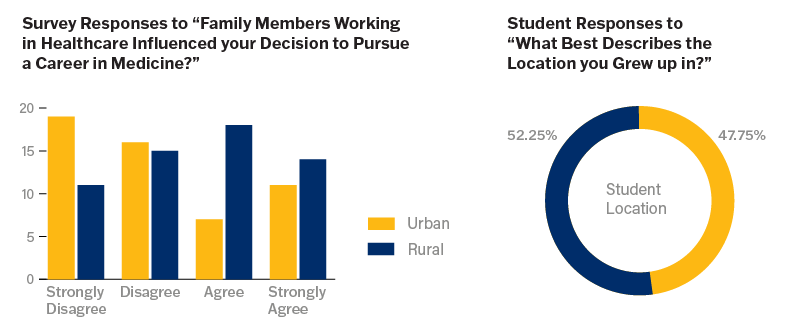
Inspiring the Next Generation of Rural Healthcare Providers
By Anthony M. Stultz '25, M.S., OMS-1 丨 June 9, 2025
Why do some students from small towns dream of healing their communities, while others in larger cities discover medicine through campus clubs and hospital volunteering? As Indiana faces a looming shortage of healthcare professionals, especially in its rural counties, understanding what drives young people to pursue medical careers has never been more urgent. As someone who grew up in one of those rural counties, I was compelled to explore that question in my thesis research, uncovering how background, mentorship, and college experiences shape the future of healthcare one student at a time.
 I’m an osteopathic medical student from Marian University’s Wood College of Osteopathic Medicine (MU-WCOM) and recent graduate of their Master of Science in Biomedical Sciences (BMS) program. My thesis research was performed under the mentorship of Erica Ausel, Ph.D., Assistant Professor of Anatomy. The results allow me to spread better awareness of what inspires students to choose careers in medicine, and helps stress the importance of addressing the shortage of health professionals in Indiana.
I’m an osteopathic medical student from Marian University’s Wood College of Osteopathic Medicine (MU-WCOM) and recent graduate of their Master of Science in Biomedical Sciences (BMS) program. My thesis research was performed under the mentorship of Erica Ausel, Ph.D., Assistant Professor of Anatomy. The results allow me to spread better awareness of what inspires students to choose careers in medicine, and helps stress the importance of addressing the shortage of health professionals in Indiana.
My thesis, titled “Future Healers: Assessing Interests in Health Professions among Younger Individuals from Rural & Urban Communities,” dives deep into the motivations, barriers; such as lack of information or resources on how to pursue a career in the health professions, and turning points that influence undergraduate students’ desire to pursue careers in medicine—and how these factors differ between students from rural and urban backgrounds.
Indiana currently ranks 43rd in overall healthcare among U.S. states; this ranking can be attributed to various factors, including access to care, quality of care, public health, and overall healthcare outcomes. My research confirmed what many healthcare leaders already fear: rural communities are hit hardest, with greater provider shortages, longer wait times, and higher rates of chronic illness such as uncontrollable type 2 diabetes, chronic hypertension, and progression of COPD.
So I asked: “How do we inspire more students—especially from these underserved areas—to join the health professions?”
To answer that, I conducted a statewide survey of 111 pre-health undergraduate students from 12 Indiana colleges. I used both quantitative data and qualitative (open-ended) reflections to gain a deeper understanding of what motivates young people to pursue careers in healthcare.

Here’s what I found:

One rural student’s words especially stuck with me: “My rural town only had one doctor growing up. People had to wait weeks to be seen. I want to change that.”
My research powerfully aligns with Marian University’s mission to serve with compassion and justice, especially in underserved communities. MU-WCOM’s focus on preparing future osteopathic physicians through a foundation in service, ethics, and community health is what drew me to this institution in the first place.
The findings of my thesis support the need for more pipeline programs, early exposure, and mentorship—all initiatives that Marian actively supports through outreach programs, pre-med clubs, and rural health partnerships.
Marian is already putting many of my research-based recommendations into action:
It’s important to reach students early, offer meaningful experiences, and encourage the motivations that arise from their communities. Institutions like MU-WCOM must lead with both science and compassion to build a workforce that will meet the healthcare needs of the future.
College may be the first time a student meets a mentor who says, ‘You can do this.’ That moment changes everything.
I’m proud to be part of a university that values research not just for academic purposes, but as a tool to shape real-world policy, practice, and pathways to care. I’m eager to continue my education in the fall at MU-WCOM and work toward my goal to become an osteopathic physician!